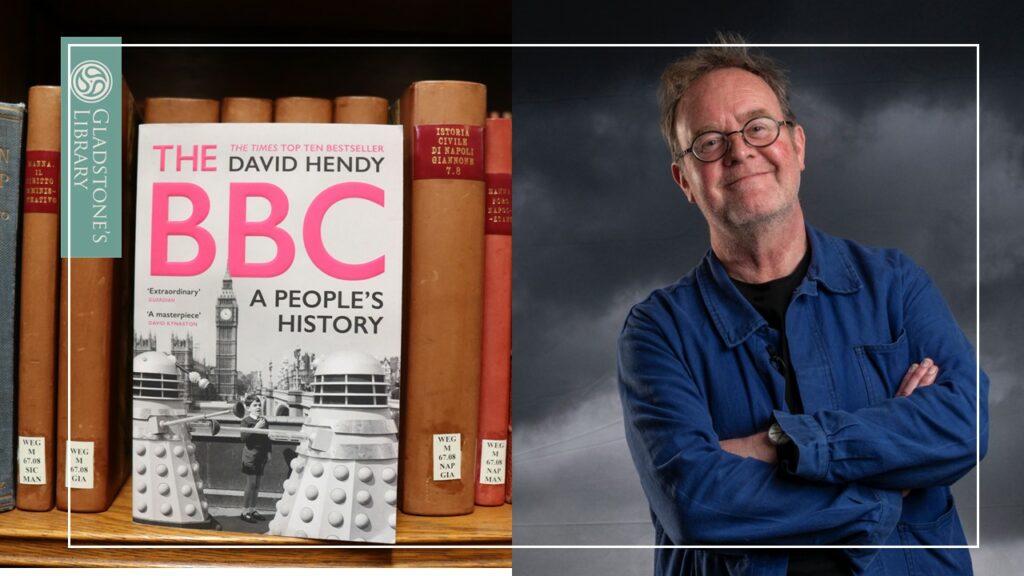Introducing everyone on the Writer in Residence shortlist for 2026…
Second in our ‘Meet the Shortlist’ series is David Hendy, who as he explains below is starting a new writing life. David is nominated for his book The BBC: A People’s History (Profile, 2022)
Was hearing about Writer in Residence the first time you’d heard of Gladstone’s Library?
I actually became aware of Gladstone’s Library a few years back and for one simple reason. I kept noticing that quite a few writers I admire – Sarah Perry, Amy Liptrot, Charlotte Higgins, Melissa Harrison, to name just a few – had spent time there. They all talked in such glowing terms about its special spirit and how being there really had helped their writing at a crucial stage in the process. So I’ve come to think of Gladstone’s as somewhere possessing an almost alchemical power.
What made you decide to go for it with an application this year?
In one sense I’m an ‘experienced’ author – with five books behind me, a sixth on the way. But all my previous books were written while I was a full-time academic. Since 2022, and after two long years of illness due to Covid, I decided to leave the relative safety of university life and set out to be a full-time writer. So, in a very real sense, I’m having to start out all over again with the current book I’m writing: trying to write differently, trying to write for a broader readership, trying to write without the usual support and feedback you get from colleagues, students, seminars and conferences. It made 2025 seem like the right moment for exploring new ways of working and new sources of inspiration.
What do you think it is about a residential library that makes it such a great place to get down to work?
Who wouldn’t want to live just a few steps away from a library – even if for just a few weeks? It shakes up the whole notion of having to squeeze reading and thinking into a few short hours of daytime. It blurs the line – deliciously – between work and leisure. It banishes the accumulation of small distractions – the cycle of domestic chores, the sounds of the busy street outside one’s home, the time and effort of setting-out on a journey somewhere (and back again). And I wonder, too, if some form of ethereal osmosis takes place: the ideas and sentences of a thousand past writers, drifting out of the volumes arranged on the shelves around you, seeping into your own imagination as you sit at a desk nearby? So it seems like the perfect recipe – and an extraordinary privilege: a space – both physical and spiritual – in which writing might begin to fly.
Lastly, please tell us all about the book that got you onto the shortlist!
The BBC: A People’s History was commissioned as the ‘authorised’ history of the Corporation, to mark its Centenary in 2022. But I had complete freedom to write as I wanted. And what I wanted was to avoid a top-down story of committees and policies, and attempt instead a kind of kaleidoscopic ‘group biography’: to tell the BBC’s story largely through the people who set it up back in 1922 and some of the men and women who followed them over the next 100 years. Why did they do it? How did their vision evolve?
The task I’d set myself involved uncovering a new ‘origin story’, built from the ground up by drawing on hundreds of recorded interviews with former members of staff – recordings that have been locked away until I was given access to them.
The BBC, I felt, had been too often seen as a dignified, but perhaps rather bureaucratic institution, useful enough in the twentieth century, out of place in the twenty-first. I wanted to breathe some life and humanity and relevance back into it, by exploring what drove the people who created it and shaped it, and showing that their motivations – the kinds of broadcasting they believed in – might just have enduring value. They belonged to a generation shaped by the experience of the First World War but also by Victorian ideals of progress. They saw broadcasting as a new and exciting way of sharing ‘the best’ that had been thought and done in human life – a democratic tool for nurturing the better angels of our nature. All the arguments that have taken place behind-the-scenes –about taste, values, morality, politics – have been united around a vision of humanity’s potential to change.
Anyone who reads the book might still end up having some very real criticisms of the BBC. I do myself. But I hope that, like me, they would at least have got under the Corporation’s skin a little more – and perhaps gained a better feeling for just what an extraordinary cultural experiment it has represented.
We’ll be posting responses from the Library’s eight-strong Writer in Residence shortlist twice a week from mid-July to mid-August. Click the Writer in Residence tag to see them all! If you’d like to support Gladstone’s Library by reading through the shortlist, you can purchase all titles via the Library’s Bookshop.org storefront.
